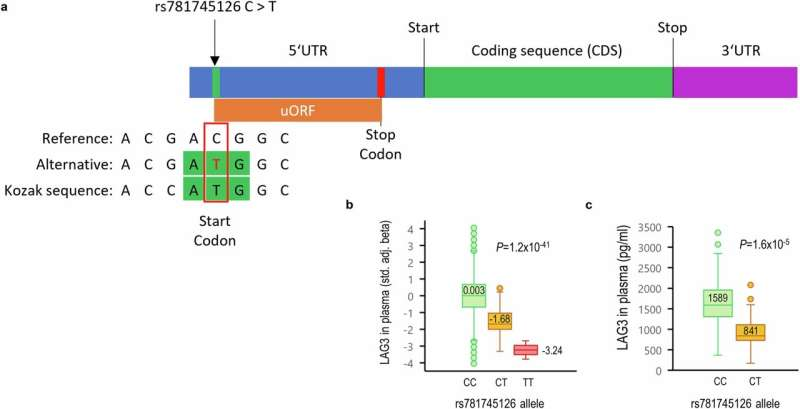Scientists uncover novel major risk gene for autoimmune thyroid disease

Scientists at deCODE genetics have published a study in Nature Communications, comparing over 110 thousand patients with autoimmune thyroid disease (AITD) from Iceland, Finland, UK and U.S. with 1.1 million controls. The findings of this study illustrate how a multiomics approach can reveal potential drug targets and safety concerns.
AITD affects over 5% of people during their lifetime and is the most common cause of thyroid dysfunction. The scientists found 290 sequence variants that associate with AITD and 115 of those had not been reported before.
Two of the newly discovered sequence variants with the largest effect on the risk of AITD are in a gene that codes for LAG-3 (Lymphocyte-Activation Gene-3) which is a co-inhibitory receptor that is important for immune homeostasis, and a target of immune checkpoint inhibitor therapy for cancer. These variants have a founder effect in Iceland and Finland and demonstrate the power of bottlenecked populations to identify rare disease-associated variants with high risk, that provide insight into the pathogenesis and potential identification of drug targets.
The Icelandic LAG3 variant confers a 3.4-fold increased risk of AITD. It generates a novel start codon for protein coding and results in a reduced capacity to induce expression of the LAG3 gene in T-cell subsets. Both activated and exhausted T-cells as well as immortalized B-cells have lower expression of LAG-3 protein on their surface and in cell supernatant.
The carriers of this variant have only half the plasma LAG-3 level of non-carriers. The variant associates with a five-fold increased risk of vitiligo, but vitiligo is like thyroid dysfunction a potential side-effect of LAG-3 inhibiting drugs, which unleash immune responses to fight cancer and can have autoimmune consequences.
Taken together, this report describes a novel major risk gene for autoimmune thyroid disease, and how the risk variant affects the expression of the gene on relevant cells and its protein product, LAG-3, in blood, thereby demonstrating its functional importance, which is akin to drugs that inhibit LAG-3.

Scientists at deCODE genetics have published a study in Nature Communications, comparing over 110 thousand patients with autoimmune thyroid disease (AITD) from Iceland, Finland, UK and U.S. with 1.1 million controls. The findings of this study illustrate how a multiomics approach can reveal potential drug targets and safety concerns.
AITD affects over 5% of people during their lifetime and is the most common cause of thyroid dysfunction. The scientists found 290 sequence variants that associate with AITD and 115 of those had not been reported before.
Two of the newly discovered sequence variants with the largest effect on the risk of AITD are in a gene that codes for LAG-3 (Lymphocyte-Activation Gene-3) which is a co-inhibitory receptor that is important for immune homeostasis, and a target of immune checkpoint inhibitor therapy for cancer. These variants have a founder effect in Iceland and Finland and demonstrate the power of bottlenecked populations to identify rare disease-associated variants with high risk, that provide insight into the pathogenesis and potential identification of drug targets.
The Icelandic LAG3 variant confers a 3.4-fold increased risk of AITD. It generates a novel start codon for protein coding and results in a reduced capacity to induce expression of the LAG3 gene in T-cell subsets. Both activated and exhausted T-cells as well as immortalized B-cells have lower expression of LAG-3 protein on their surface and in cell supernatant.
The carriers of this variant have only half the plasma LAG-3 level of non-carriers. The variant associates with a five-fold increased risk of vitiligo, but vitiligo is like thyroid dysfunction a potential side-effect of LAG-3 inhibiting drugs, which unleash immune responses to fight cancer and can have autoimmune consequences.
Taken together, this report describes a novel major risk gene for autoimmune thyroid disease, and how the risk variant affects the expression of the gene on relevant cells and its protein product, LAG-3, in blood, thereby demonstrating its functional importance, which is akin to drugs that inhibit LAG-3.
International Conference on Genetics and Genomics of Diseases
Visit: genetics-conferences.healthcarek.com
Award Nomination: x-i.me/gennom1
Award registration: x-i.me/genreg2
Member Nomination: x-i.me/genmember
Member Registration: x-i.me/genreg1
For Enquiries: genetics@healthcarek.com
Get Connected Here
------------------------------
------------------------------
Pinterest: x-i.me/genpt
Twitter: x-i.me/gentw
Facebook: x-i.me/genfb
Instagram: x-i.me/genin
Youtube: x-i.me/genyt
Blogger: x-i.me/genbl
Comments
Post a Comment